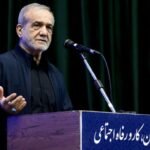
BY MOHAMMAD TARIQUE SALEEM
For decades, the Middle East has been gripped by a suffocating silence, broken only by the cold calculations of regimes that traded faith for favor, and justice for jets. Today, that silence is shattering. Viral videos show a rising tide of defiance, with citizens of QATAR demanding an end to the U.S. military presence in their lands. This is not mere protest, it is a people’s verdict on decades of betrayal. The betrayal of Palestine. The betrayal of unity. While Gaza bleeds under relentless Israeli assault, funded and shielded by American power, many Sunni-led governments remain complicit, choosing alliances of convenience over moral courage. But amid this collapse of conscience, Iran has stood firm. Sanctioned, isolated, and demonized, yet undeterred, Iran has emerged as the heart of resistance. It is no longer just a nation, it is a movement. A declaration that dignity cannot be bought, and true leadership demands sacrifice, not silence.

For decades, the geopolitics of the Middle East has been a theatre of contradictions, betrayals, and alliances forged not through brotherhood or faith, but through interests woven tightly with the power corridors of Washington. Beneath the surface of grand speeches and hollow summits lies a painful truth: many Sunni-dominated regimes, who project themselves as guardians of the Muslim world, have long chosen proximity to the United States over solidarity with the oppressed particularly the Palestinians, who continue to bleed in Gaza.
The paradox is glaring. The same Muslim governments that host conferences on Muslim unity stand silently, even smiling, beside the very powers responsible for the suffering of their fellow believers. Among the most jarring illustrations of this hypocrisy is Pakistan, a nation that takes pride in its Islamic identity and calls itself the “Fortress of Islam.” Yet, when its Army Chief, General Asim Munir, recently accepted a luncheon invitation from Donald Trump a U.S. President known for his unabashed support for Israel and hostility toward Iran it was not merely a diplomatic engagement. It was a symbolic handshake with the very hand that fuels the machinery killing innocent civilians in Gaza.
Qatar, too, wears a mask of duality. On one side, it positions itself as a humanitarian actor and mediator, regularly voicing concerns for Palestinians. On the other, it harbors Al-Udeid Air Base the largest American military base in the Middle East from which sorties and operations have been launched against resistance forces, including those aligned with Iran. While the skies over Gaza were set ablaze, missiles that traced back to this very soil struck down allies of the resistance. It is a cruel irony that Muslim land became the staging ground for aggression against fellow Muslims.
Now, a new chapter of defiance is unfolding. According to recent viral videos, citizens Qatar have taken to the streets, chanting slogans demanding the expulsion of U.S. military bases from their homelands. The frustration is no longer confined to intellectual circles or political commentators it is resonating in the streets, in the hearts of ordinary Muslims. This grassroots outrage is not only a symbol of awakening but a sign of what’s to come. The regimes that remain hand-in-glove with the United States may soon find their own people rejecting the hypocrisy that has defined their foreign policy for decades.
As the world watched the slow and calculated annihilation of Gaza for over two years, the silence from the Sunni world echoed louder than bombs. Gaza has not just been attacked it has been devastated. Streets turned into graveyards. Hospitals into ruins. Children into memories. And through all this, the so-called Muslim leaders of Saudi Arabia, the UAE, Egypt, and others offered little more than somber condolences, redundant aid, and scripted diplomatic statements. They strengthened trade ties, deepened security cooperation with Israel’s allies, and turned their backs on the cries from Gaza’s broken alleys.
The Organization of Islamic Cooperation (OIC), comprising 57 member states, has so far performed little beyond issuing diluted resolutions and hosting perfunctory summits. The tears of mothers burying their children in Gaza have not moved this bloc to take concrete action not a single sanction, not a single coordinated embargo, not even a symbolic withdrawal of ambassadors. It is as though Gaza’s agony is tolerated as long as trade routes and arms deals remain intact. This moral bankruptcy has tarnished the credibility of the OIC, turning it into a ceremonial platform devoid of resolve or spine.
And yet, in this ocean of betrayal and silence, one nation has stood its ground the Islamic Republic of Iran. Despite being a Shiite-majority state surrounded by predominantly Sunni neighbors, Iran has risen time and again in defense of Gaza, not because of sect, but because of principle. It has endured sanctions, isolation, and attacks, but it has never flinched. When others toasted with occupiers, Iran armed the resistance. When others built trade routes with tyrants, Iran offered its military expertise to the besieged. While Sunni states drowned in excuses, Iran stood firm in resistance.
Iran’s sacrifice has been immense. From the assassination of General Qassem Soleimani in 2020 by a U.S. drone strike, to the tragic helicopter crash in 2024 that claimed the life of President Ebrahim Raisi, Iran has lost giants of its revolution. Its scientists have been assassinated, its infrastructure bombed, and its people punished through sanctions. Yet, it has not abandoned Gaza. It has retaliated with precision strikes, disrupted Israeli ambitions with cyber warfare, and fortified the hands of resistance movements like Hezbollah. Had Iran not stood firm, Gaza might have been erased from the map by now.
A significant shift occurred on June 22, 2025. At the OIC Foreign Ministers’ meeting in Istanbul, for the first time in history, all 57 member states including traditional Sunni rivals unanimously condemned Israeli and U.S. attacks on Iranian nuclear facilities. This moment was not charity. It was earned. The Islamic Republic of Iran, through its resilience, had compelled the very nations who once maligned it to now stand in solidarity with it. It was not Iran that changed it was the Muslim world that could no longer ignore its steadfastness.
This recognition was a tectonic moment in Middle Eastern politics. Iran, once treated as an ideological pariah, was now acknowledged as the legitimate voice of resistance and justice. In a region where power has long been equated with wealth and Western backing, Iran flipped the script. Its strength emerged from integrity, not opulence. From courage, not compliance. While others decorated their halls with imported chandeliers and foreign advisors, Iran built missiles, hospitals, and alliances rooted in dignity.
Today, Iran, under the resolute leadership of Ayatollah Khamenei, stands not merely as a symbol, but as the de facto superpower of the Middle East. Its military capabilities are unparalleled in the region from hypersonic missiles to cutting-edge drones, Iran has transformed technological innovation into formidable deterrence. Its sphere of influence stretches from Lebanon to Yemen, and from Syria to Iraq, where its ideological clarity and strategic foresight continue to shape the region’s political landscape. Even under the weight of severe sanctions, Iran has sustained robust trade relations with China, forged strategic partnerships with Russia, and inspired millions across the Muslim world with its unwavering resilience and unbreakable will.
This is a wake-up call for the Sunni-dominated regimes. Their golden palaces and American-made weapons could not win them the respect that Iran, through its blood and backbone, has earned. While they wavered between their thrones and Washington’s approval, Iran carved a new path one that placed justice above diplomacy and sacrifice above self-interest. The message is clear: True leadership is not about hosting summits; it’s about standing with the oppressed, no matter the cost.
The Muslim Ummah is awakening. The sectarian labels that once divided are fading before the moral clarity Iran has provided. Its support from all 57 OIC states is not just a political milestone it is a declaration that the tide is turning. That Muslims, everywhere, are beginning to see beyond rhetoric and towards those who walk the talk. Iran’s defiance, its losses, and its steadfastness have made it the heart of a new Islamic awakening. In this decisive moment, the Muslim world must ask itself: Will we continue to dine with oppressors or rise with the oppressed? Iran has already chosen its side the side of truth, resistance, and Gaza. Now, it is up to the rest of the Ummah to follow not the path of convenience, but of conscience.










